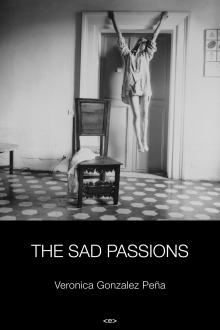The Sad Passions
 The Sad Passions
The Sad Passions
by Veronica Gonzalez Peña
Semiotext(e) / Native Agents, May 2013
344 pages / $17.95 Buy from Amazon or MIT Press
The cover of Veronica Gonzalez Peña’s novel, The Sad Passions keeps changing on me. It’s a Francesca Woodman photo—a woman or an apparition. She is suspended in air or hanging on for dear life. She is a martyr or a demon. She is in pain or in the realm of the sublime. She is being crucified or being exorcised or being made a martyr. I keep approaching the possibilities of this puzzling image and watch the figure grow porous the longer I look. She is an unstable subject and as I make my way through the novel, it’s the chair that grows more present, more formed than the person. Something in it’s gaping emptiness, the carelessly draped cloth suggesting a body, now gone. I like the way the image moves with this novel, the way the absence becomes the presence. Veronica Gonzalez Peña does not write absence as a form of lack, her absence froths and grows agitated, it fills up the page with pulsing need.

The Sad Passions follows four sisters, their lives punctuated by their mother’s mental illness, by an inheritance of cumulative ancestral pain. The sisters, while distinctly different from one another, all grapple with the fear that their mother’s madness might become their own, that their identities might slip quietly, at any trigger. One gets a sense that at the turning of the page one sister might become the other or that they might all become their mother or they might all melt into a composite figure.
It’s precisely this plurality, this repetition/duplication of identity that is at the center. In a chapter told from the perspective of the 2nd eldest sister Julia, Gonzalez Peña writes,
Each chapter is told from the perspective of a different character, often retelling the same traumatic events but with startling different sentiment. There is something in the retelling process, the approaching of truth by making different angled entries but never quite locating truth, dancing towards it—if only to say that understanding trauma, by nature is a process of de-centering, that understanding must be choral.
August 12th, 2013 / 11:00 am
